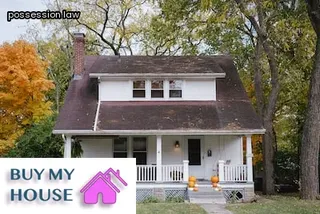Squatting, or occupying a property without authorization from the legal owner, is an issue that affects Massachusetts real estate owners. In Massachusetts, squatting is illegal and punishable by law.
Squatters have been known to occupy properties for extended periods of time without paying rent or property taxes, creating a challenge for landlords who are trying to maintain their investments. In some cases, squatters may even be able to claim rights to the property after a certain period of occupancy.
It is important for Massachusetts real estate owners to understand their rights regarding squatting and how they can protect themselves and their properties should a squatter occupy their land. Knowing what laws apply and how best to handle the situation will help real estate owners better prepare for any potential issues with squatters in Massachusetts.

Squatters' rights, also known as adverse possession, refer to laws in Massachusetts that allow an individual to take ownership of real estate by occupying it for an extended period of time. In order to qualify under the law, a squatter must demonstrate continuous occupancy and maintenance of the property for a minimum of 20 years.
The individual must also establish evidence that they are using the property as their primary residence without permission from the legal owner. To further complicate matters, squatters may be able to obtain title to the land if they pay taxes on it for at least seven years and can prove that they have been paying these taxes.
It is important for real estate owners in Massachusetts to understand these laws and take steps to protect their property from potential squatters.
To avoid becoming a squatter in Massachusetts, it's important to understand the state's laws and how they protect real estate owners. Knowing your rights and responsibilities as a property owner can help prevent squatters from settling on your land.
It is essential for real estate owners to be aware of the applicable statutes that affect their property and to take necessary steps to ensure that no one has unauthorized access or use of their property. This includes keeping the premises secure with guards, locks, and fences; posting signs warning against trespassing; and staying informed about local squatting activities.
Additionally, if you are aware that someone is living on your property without permission, be sure to file a complaint with local law enforcement immediately. Taking these proactive measures will help reduce the chances of becoming a victim of squatting in Massachusetts.

Adverse possession and color of title are two distinct concepts when it comes to understanding squatters' rights in Massachusetts for real estate owners. Adverse possession is a legal doctrine that grants someone who lives on another person's property for a certain period of time the right to own said property — as long as certain conditions are met.
Property acquisition through adverse possession can be established after twenty years of uninterrupted, open and notorious use of the land. To fulfill these conditions, the squatter must show that they have exclusive use of the property and that they paid any taxes associated with it.
On the other hand, color of title is when someone has an instrument or document that appears to give them ownership rights over a particular piece of land but is ultimately invalid due to some technical defect in how it was created or acquired. In these cases, if a squatter has been living on the land for up to twenty years without interruption, they may have a claim against the rightful owner.
It is important for real estate owners in Massachusetts to understand both adverse possession and color of title so they can protect their property from potential squatters.
In Massachusetts, property owners should be aware of the legal implications of having a squatter on their land. It is important to understand that taxes must still be paid on the property and any improvements made by the squatter may not be deducted from that year’s tax bill.
Property owners should also know that while they are responsible for maintaining and providing basic services to their tenants, they are not responsible for providing these same services to squatters. Further, if squatters occupy your land for more than one year, they may have rights to the property under certain circumstances.
Finally, even if a squatter does not meet all of the qualifications of an actual tenant, it is important for property owners in Massachusetts to recognize that certain protections exist under state law for unauthorized occupants.

As a real estate owner in Massachusetts, it is important to be aware of your rights when it comes to protecting your property from squatters. In order to protect yourself and your property, it is essential to be familiar with the laws governing squatter's rights in Massachusetts.
Squatting on someone's land without permission or legal claim can result in civil action and criminal charges against the squatter. It is important to understand that squatting does not give a person any legal right to the property, even if they have been living there for an extended period of time.
It is also important to know that you do have recourse against a squatter if they are illegally occupying your land, including filing an unlawful detainer complaint in court. Taking swift action against squatters is critical, as failure to do so could leave you open to financial liability and other costs associated with evicting them from your property.
Additionally, understanding the state's laws related to trespassing can help you preemptively protect yourself from potential squatters in the future.
When it comes to understanding squatting laws across states, Massachusetts is very unique in its approach. While most states have laws that criminalize certain types of squatting activities, such as breaking and entering or destruction of private property, Massachusetts does not have any specific laws related to the issue.
Instead, the state relies on common law trespass and landlord-tenant laws to regulate any disputes between property owners and squatters. In general, a property owner in Massachusetts must first prove that they have exclusive possession of the property before they can take action against a squatter.
If they are unable to do so, then the courts may decide whether or not the squatter has established legal rights over the property through adverse possession, which requires continuous occupancy for a period of twenty years. This means that real estate owners in Massachusetts must be aware of their rights regarding squatters and understand how to go about protecting themselves from potential squatters who may attempt to claim ownership over their properties.

Removing unlawful occupants from real estate in Massachusetts can be a difficult and frustrating process for owners, but there are strategies that can help them reclaim their property. The first step is understanding the laws regarding squatters' rights; these laws state that if someone has been living on a property for an extended period of time, they may have some legal rights to stay, even if they don't own or rent the space.
This means that simply asking an occupant to leave may not be enough to reclaim your property. To successfully remove a squatter, owners should consider hiring an attorney who specializes in eviction proceedings and familiarize themselves with relevant state statutes.
It's important to follow all applicable regulations as closely as possible while proceeding with an eviction case; failure to do so could result in further delays or legal penalties. In addition, it may be beneficial to consult local law enforcement officers who can provide information about how best to handle the situation and ensure that the property owner's rights are protected.
In Massachusetts, squatting is a legal issue that all real estate owners should be aware of. The law governing squatters' rights in the state can be complex, but understanding it is essential for anyone owning property.
Legal precedent in Massachusetts suggests that a squatter may establish rights to the property by occupying it continuously and openly for more than 20 years. Squatters may also gain possession of the property if they have paid taxes on it or if they have made improvements to the land or property.
To prevent squatting from happening and to protect their rights, real estate owners should always make sure their property is registered with the municipality in which it is located and inspect the land regularly to check for any illegal occupants. Furthermore, if an owner discovers someone squatting on their land then they should take swift legal action and contact a lawyer as soon as possible.

In Massachusetts, squatters' rights are protected by several state statutes related to adverse possession. According to these statutes, a squatter may gain legal ownership of a property if they can prove that they have been living there openly, continuously and exclusively for at least 20 years.
The squatting party must also pay all taxes owed on the property during this period of time and make necessary improvements to the land. Additionally, if the real estate owner decides to take action against the squatter or bring an eviction suit, it must be done within 10 years of when the squatter began occupying the premises.
After 10 years has passed and no action was taken by the original owner, then title of the property will often be transferred to the squatter. Lastly, it is important for owners to note that unless they are claiming abandonment by another party of the property in question, any landlord-tenancy laws do not apply in these cases.
When it comes to understanding squatters' rights in Massachusetts, the court has determined a number of relevant cases and decisions on squatting and adverse possession. In particular, a landmark case from 1984, Meleski vs.
Buckley, established that adverse possession could not be claimed under the doctrine of tenancy by sufferance. This means that simply occupying another person's land without permission does not entitle one to legal ownership.
The court also found that the owner of the property can re-enter their land at any time even if it is occupied by someone else, unless their tenant has acquired legal title through adverse possession after meeting certain conditions for a minimum period of time. Additionally, in 2019, the Supreme Judicial Court ruled in favor of an owner who had lost his property due to an adverse possession claim as a result of failing to pay taxes.
From these cases, it is evident that understanding squatters' rights in Massachusetts requires knowledge of relevant court decisions and laws governing adverse possession.
If you own real estate in Massachusetts and have a squatter on it, there are certain steps you can take to get rid of them. First, you should contact any local law enforcement agency in the area and explain the situation.
They may be able to help you understand your legal rights as a property owner, as well as explain the legalities involved in evicting a squatter. If local law enforcement is not able to assist with the matter, then you may need to take civil action against the squatter by filing an ejectment lawsuit.
In this case, it is important to understand that Massachusetts state laws recognize squatters' rights, so it is important that all actions taken in removing them from your property are done according to their guidelines. Additionally, you could also seek out assistance from a real estate attorney who can help guide you through the legal process of evicting a squatter from your property.
Ultimately, following these steps will ensure that all parties involved are aware of their rights and responsibilities when dealing with a squatter in Massachusetts.

In Massachusetts, the time frame for squatters rights is rather short. Squatters rights, also known as adverse possession, are acquired after the squatter has been in physical possession of a property for twenty years without interruption or challenge from the lawful owner.
This means that if someone has been living on your property without your consent for 20 years or more, they may be able to acquire legal title to the property. The shorter time frame makes it important for real estate owners in Massachusetts to be aware of their rights and take action quickly should someone attempt to claim ownership under this law.
It's important to note that certain circumstances must be met in order for a squatter to gain legal title, so understanding the requirements and taking appropriate steps is key for real estate owners who want to protect their property from potential squatters.
Yes, there is a law in Massachusetts that allows for adverse possession, more commonly referred to as squatter's rights. In order for a squatter to gain legal rights to the property they are occupying, they must abide by certain conditions.
These conditions must be met over a period of time typically ranging from 10-20 years and include paying taxes on the property, maintaining it, and using it exclusively for their own purposes. The court also considers whether or not the owner was aware of the occupant’s presence on the land.
If all of these conditions are met then the squatter may gain title to the property through what is known as adverse possession in Massachusetts.
Are Squatters' Rights OK? In Massachusetts, squatters’ rights are determined by the state's laws and regulations. Squatting is a legal term used to describe when an individual occupies a property belonging to another person without any legal right or consent from the owner.
Though it is illegal in Massachusetts, there are certain factors that can make squatting permissible. For example, if the squatter has been on the property for a long period of time and has made improvements or repairs on it, then they may be able to claim some of the rights associated with ownership.
Furthermore, if the owner has failed to pay taxes on their property for an extended period of time, then they may also be subject to squatters’ rights. It's important for real estate owners to understand their options when dealing with squatters in Massachusetts so that they know how best to protect their property.